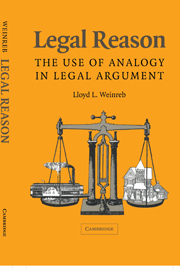Book contents
- Frontmatter
- Contents
- Preface
- Introduction
- 1 Analogy and Inductive and Deductive Reasoning
- 2 Steamboats, Broadcast Transmissions, and Electronic Eavesdropping
- 3 Analogical Legal Reasoning
- 4 Analogical Reasoning, Legal Education, and the Law
- Appendix A Note on Analogical Reasoning
- Appendix B Biographical Notes
- Notes
- Index
Introduction
Published online by Cambridge University Press: 05 June 2012
- Frontmatter
- Contents
- Preface
- Introduction
- 1 Analogy and Inductive and Deductive Reasoning
- 2 Steamboats, Broadcast Transmissions, and Electronic Eavesdropping
- 3 Analogical Legal Reasoning
- 4 Analogical Reasoning, Legal Education, and the Law
- Appendix A Note on Analogical Reasoning
- Appendix B Biographical Notes
- Notes
- Index
Summary
This is a book about the arguments that lawyers make in support of their clients and judges make in the course of their opinions. That is not the whole of the law, which extends in every direction and takes many different forms. The pattern of reasoning of those who are engaged elsewhere in the law, in the legislative process or in the regulatory or administrative process, is different. But adjudication, in which lawyers' arguments and judicial opinions hold sway, is typically the place where the law is brought to bear concretely and, to use a current expression, “the rubber hits the road.” No effort to understand and explain the law or the legal process can succeed unless the arguments of lawyers and judges are understood. Those arguments, furthermore, are what people have in mind when they speak about legal reasoning. It is widely believed that legal reasoning is somehow special, not just in its subject matter but in its very form. In a law school class, a professor, intending high praise, may say to a student, “Now you are thinking like a lawyer,” as if a legal education equips a person to think in a way unknown to others. And, indeed, a great deal has been written about the nature of legal arguments. Yet it would be odd if legal reasoning were somehow different from reasoning about other subjects. Doctors and engineers also have their special expertise.
- Type
- Chapter
- Information
- Legal ReasonThe Use of Analogy in Legal Argument, pp. 1 - 18Publisher: Cambridge University PressPrint publication year: 2005

